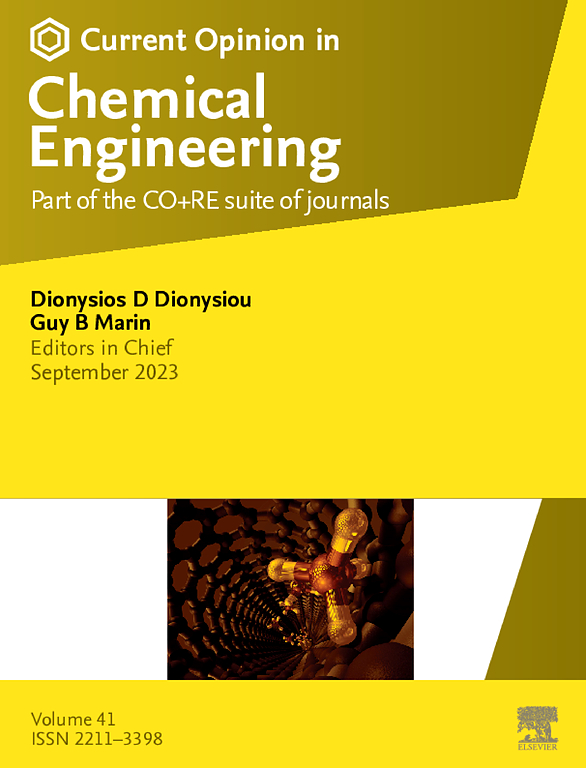Industrial Agentic AI and generative modeling in complex systems
IF 6.8
2区 工程技术
Q1 BIOTECHNOLOGY & APPLIED MICROBIOLOGY
引用次数: 0
Abstract
Manufacturing, consumer, transportation, and supply chain processes present significant challenges in monitoring, control, and design due to their inherently nonlinear nature and the difficulty of measuring critical variables in real time. The convergence of major innovations from the computer science field has the potential to revolutionize the engineering and control of complex industrial systems. Digital twinning and process simulation have been a staple of computers in process engineering for decades now. However, the advent of advanced sensor systems and big data integration, combined with generative AI and agentified AI (classic and quantum) systems, allows for much more granular and autonomous process control and real-time optimization of complex systems. Advanced process modeling, Agentic AI, and generative AI models have emerged as powerful tools to address the challenges of complex nonlinear systems. We propose here an integrated systems feedback and control architecture (SIC: Sense, Infer, Control) that leverages complementary process knowledge for enhanced real-time monitoring and decision-making, fully integrated into control system functions and the accompanying sensors. In this paper, we explore this integration of generative models in agentic AI ensembles into industrial processes through the lens of four recent industrial case studies: (1) the real-time optimization of motorsports strategy, (2) the development of indirect (soft) sensors for sustainable large-scale manufacturing operations, (3) the creation of sensor data-driven personalized health and cosmetic chemical formulations, and (4) the design of biomanufacturing systems using quantum and classic Agentic AI. These examples demonstrate how agentic and generative models, combined with full-scale process simulation and digital twinning, effectively augment process control, enabling advanced solutions for process optimization, quality improvement, and sustainable operations. The proposed SIC systems architecture serves to enhance process control automation by capturing complex nonlinear patterns and leveraging easily measurable variables. Generative models bridge gaps in process understanding, sensor technologies, control, and monitoring, offering actionable insights for efficient and informed decision-making across diverse industrial applications.
复杂系统中的工业代理人工智能和生成建模
由于其固有的非线性性质和实时测量关键变量的困难,制造、消费、运输和供应链过程在监测、控制和设计方面提出了重大挑战。计算机科学领域的重大创新的融合有可能彻底改变复杂工业系统的工程和控制。几十年来,数字孪生和过程模拟一直是过程工程中计算机的主要技术。然而,先进传感器系统和大数据集成的出现,结合生成式人工智能和代理人工智能(经典和量子)系统,允许更精细和自主的过程控制以及复杂系统的实时优化。先进的过程建模、人工智能代理和生成式人工智能模型已经成为解决复杂非线性系统挑战的强大工具。我们在这里提出了一个集成的系统反馈和控制架构(SIC: Sense, Infer, control),它利用互补的过程知识来增强实时监测和决策,完全集成到控制系统功能和伴随的传感器中。在本文中,我们通过四个最近的工业案例研究,探讨了将人工智能集成中的生成模型集成到工业过程中的问题:(1)赛车策略的实时优化,(2)为可持续大规模制造运营开发间接(软)传感器,(3)创建传感器数据驱动的个性化健康和化妆品化学配方,以及(4)使用量子和经典代理人工智能设计生物制造系统。这些例子展示了代理和生成模型如何与全尺寸过程模拟和数字孪生相结合,有效地增强过程控制,为过程优化、质量改进和可持续运营提供先进的解决方案。提出的SIC系统架构通过捕获复杂的非线性模式和利用易于测量的变量来增强过程控制自动化。生成模型弥补了过程理解、传感器技术、控制和监测方面的差距,为各种工业应用的有效和明智决策提供了可操作的见解。
本文章由计算机程序翻译,如有差异,请以英文原文为准。
求助全文
约1分钟内获得全文
求助全文
来源期刊

Current Opinion in Chemical Engineering
BIOTECHNOLOGY & APPLIED MICROBIOLOGYENGINE-ENGINEERING, CHEMICAL
CiteScore
12.80
自引率
3.00%
发文量
114
期刊介绍:
Current Opinion in Chemical Engineering is devoted to bringing forth short and focused review articles written by experts on current advances in different areas of chemical engineering. Only invited review articles will be published.
The goals of each review article in Current Opinion in Chemical Engineering are:
1. To acquaint the reader/researcher with the most important recent papers in the given topic.
2. To provide the reader with the views/opinions of the expert in each topic.
The reviews are short (about 2500 words or 5-10 printed pages with figures) and serve as an invaluable source of information for researchers, teachers, professionals and students. The reviews also aim to stimulate exchange of ideas among experts.
Themed sections:
Each review will focus on particular aspects of one of the following themed sections of chemical engineering:
1. Nanotechnology
2. Energy and environmental engineering
3. Biotechnology and bioprocess engineering
4. Biological engineering (covering tissue engineering, regenerative medicine, drug delivery)
5. Separation engineering (covering membrane technologies, adsorbents, desalination, distillation etc.)
6. Materials engineering (covering biomaterials, inorganic especially ceramic materials, nanostructured materials).
7. Process systems engineering
8. Reaction engineering and catalysis.
 求助内容:
求助内容: 应助结果提醒方式:
应助结果提醒方式:


